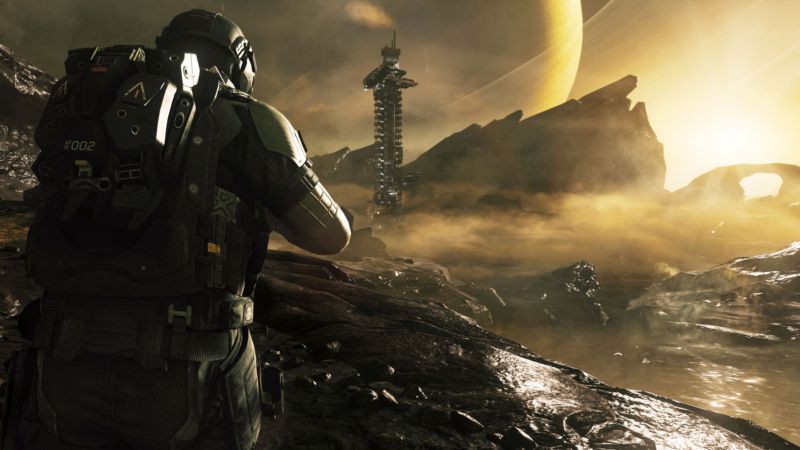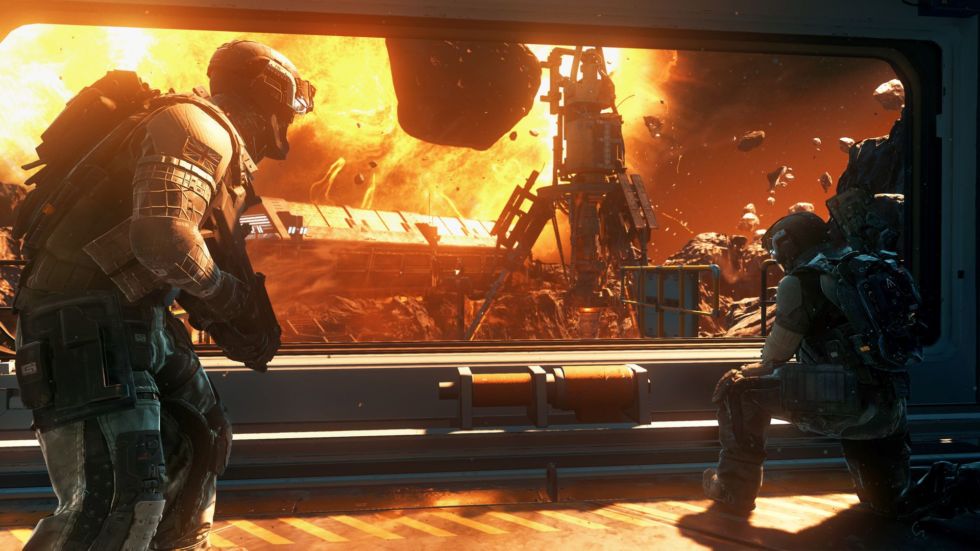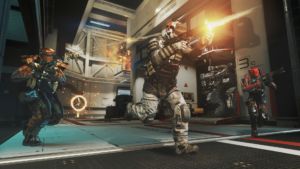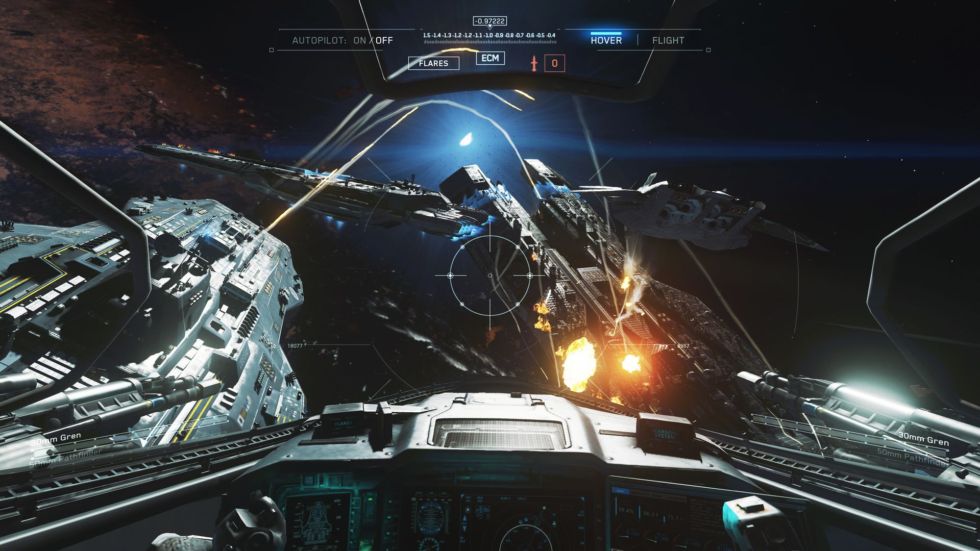
With Infinite Warfare that skirting flirtation goes out the window completely. This is a game rife with spaceships, warp drives, and laser weapons, which feel more in line with Star Trek and Battlestar Galactica than Call of Duty. Rather than fight through the cities of Earth, Infinite Warfare sends you to the far reaches of the Solar System to battle above planets; instead of ultranationalist radicals, you fend off a Martian insurgency, hell-bent on taking your home world for its own.
It makes for a far fresher game, at least in single-player. This is a campaign that not so much shrugs but violently shakes off the lacklustre Ghosts moniker—Infinity Ward’s previous entry in the franchise—which many people (myself included) interpreted as a sign that the developer was out of ideas. While it’s clear that its ideas are still relatively thin on the ground, Infinite Warfare is by far the best campaign the series has seen in years. It’s just a shame that its multiplayer, while robust, is substantially lacking where rivals like Battlefield 1 have excelled.
Going it alone
This large shift in focus is the most surprising thing about Infinite Warfare. For years now, multiplayer has always been the main draw in Call of Duty, but here that’s different, with the seven-hour campaign taking centre stage. It’s the writing that really seals the deal; despite its huge leap into the intergalactic future, Infinite Warfare retains a relatable sense of humanity that grounds its hyper-intense action. You might be fighting against mechanised infantry and skating across the frozen surface of Europa, but developer Infinity Ward delivers the most intelligently scripted Call of Duty game since Modern Warfare, one that avoids absurd ideas like Ghosts’ obsession with VR and strips things back. It focuses on a single band of soldiers, the pressures of leadership, and whether the success of a mission is more important than the lives of the men carrying it out.


Those missions are vital to the survival of Earth’s population. As humanity progressed beyond present day, so Infinite Warfare’s story goes, it ventured out into the Solar System to offset Earth’s dwindling resources. This colonisation of other planets and moons subsequently leads to the rise of insurgencies beyond Earth’s borders.
The group you fight throughout Infinite Warfare’s campaign is the Settlement Defense Front, Martian rebels led by Kit Harrington’s Admiral Kotch—a ruthless ideologue and ultimate bad guy who’s hell bent on destroying Earth. He makes this clear in the game’s opening hours, wherein Earth suffers a devastating attack. It reminded me of Halo 2’s introductory assault by the Covenant, but despite Kotch’s overwhelming cruelty his character feels underworked, and rather than give him any real motivations, Infinity Ward leaves Kotch as a bad dude who does bad things because… reasons.
The rest of the cast fares far better, though. You play as Nick Reyes, a Tom Cruise-alike who has been thrust into the unenviable position of inheriting a capital ship, the Retribution, and its hundreds of crew. Your mission is to buy Earth time to rebuild its fleet before you take the fight directly to Kotch and his SDF goons. It’s a simple, no-nonsense story, but it’s told with such fervour that Infinite Warfare is elevated far beyond its recent predecessors.
Nick is likeable, loyal, and honourable, and his crew and close teammates are just as personable. David Harewood’s Sergeant Omar is an absolute badass Englishman, while Reyes’ closest partner, Nora Salter (or Salt to those who know her best) is as strong minded and likeable as he is, delivering the pitch-perfect mix of admiration and criticism towards his decisions as a leader. Then there’s Ethan, the highlight of the game’s cast, an AI robot whose wit is only as good as his abilities in combat and who acts as lighthearted relief to what is an otherwise fairly dour tale of survival and impossible odds.

These varied personalities give Infinite Warfare a surprising amount of heart, which you wouldn’t expect from a game that has you traversing through asteroid fields and fighting above the rings of Saturn. It’s here, in its litany of missions, that Infinite Warfare delivers the slick action that the Call of Duty franchise is so famous for. The on-the-ground combat remains near-identical to previous games, but there’s a thrill to finding and experimenting with its host of new weapons. There are anti-gravity grenades, for instance, which lift groups of enemies into a vulnerable stasis for you to pick off one by one, and seeker grenades that scuttle along the ground like terrifyingly effective metal spiders, attaching themselves to unfortunate victims and exploding on their faces.
It’s much bloodier than other Call of Duty games, too—an experimental laser weapon disintegrates enemies to a bloody mist, while there’s great satisfaction to be had (and probably a hint of guilt) mêléeing enemies out in space, ripping their helmets off so they suffocate in front of you. Then there are the dogfights, in which you hair around in a small fighter ship, locking onto enemy targets to pursue them through debris fields and across the bows of enormous capital ships. To begin with, these are surprisingly exciting distractions that capture the frantic nature of dodging enemy lock-ons and casting flares to avoid being hit by incoming missiles. But they eventually lose their shine and feel more like repetitive filler that, while visually spectacular, just aren’t varied enough to justify how frequently they pop up.
Luckily, a lot of these missions can also be undertaken at your leisure. Infinite Warfare retains its linear storytelling, so don’t expect any branching narrative paths, but certain missions are entirely optional and can be completed in any order. While this allows you to decide what you want to do at most points throughout the story, it’s an odd design decision that breaks up the action and leads to a number of boring plods through the Retribution’s bridge area to choose your next objective. It’s clear what was intended—a period of downtime with your crew to punctuate the unrelenting drama—but it doesn’t work.
Still, the campaign’s best moments are fantastic. A breakneck excursion to the Moon is a particular campaign highlight (I shan’t spoil specifics), and there’s also a brilliant mission set on an asteroid that’s orbiting Mercury at ridiculous speeds, giving it a 30-second day/night cycle where the intense heat of the Sun roasts you alive if you’re caught outside for more than a second.
Infinite Warfare looks beautiful, too, running at a near-flawless 60FPS on PlayStation 4 (there are resolution enhancements for PS4 Pro players) and dazzling with just the right amount of lens flare to make it feel like science-fiction, while grounding everything with a pragmatic function-not-form aesthetic to vehicles and spacecraft. Don’t be fooled by the jump to hyperspace—this is still very much a military shooter.
reader comments
34